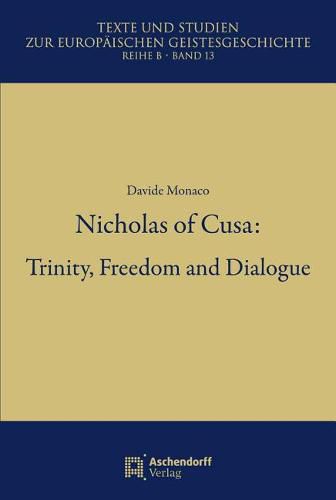Readings Newsletter
Become a Readings Member to make your shopping experience even easier.
Sign in or sign up for free!
You’re not far away from qualifying for FREE standard shipping within Australia
You’ve qualified for FREE standard shipping within Australia
The cart is loading…






Trinity, freedom and dialogue not only represent three themes of Nicholas Cusanus’ thought, but provide a possible hermeneutic key to reading his work and understanding his philosophy. Through a historico-philological and theoretico-speculative investigation, an attempt is made to investigate Cusanus’ complex reflection on the One and his reflections on the concept of man and religion. If Cusanus has collated Platonic and Neoplatonic reflection, in particular from Plato, Proclus and Dionysius, he managed at the same time to direct their teachings towards the Trinity. In his last works he reformulates his theory of the First Principle by endeavouring to thematize and give greater emphasise to the freedom of the One. But if freedom denote divine acting, it cannot but imprint also the being of his image, that is to say of man, whose mind is defined as viva imago Dei. Only by starting out from these presuppositions can the dialogical perspective be understood that he elaborated as response to the burning issue then current in his day of encounter, namely the meeting and clashing among the different cultures and religions. At the bloody conquest of Constantinople at the hands of the Turkish army (1453), just at the moment when all Europe was crying out for a recourse to arms and a crusade, the German philosopher and cardinal laid aside the merely denigratory and condemnatory designs against Islam in an attempt to make Christians realise that by putting faith in the one God there existed scope for possible mutual understanding and communion, that was essential for embarking on the way towards peace.
$9.00 standard shipping within Australia
FREE standard shipping within Australia for orders over $100.00
Express & International shipping calculated at checkout
Stock availability can be subject to change without notice. We recommend calling the shop or contacting our online team to check availability of low stock items. Please see our Shopping Online page for more details.
Trinity, freedom and dialogue not only represent three themes of Nicholas Cusanus’ thought, but provide a possible hermeneutic key to reading his work and understanding his philosophy. Through a historico-philological and theoretico-speculative investigation, an attempt is made to investigate Cusanus’ complex reflection on the One and his reflections on the concept of man and religion. If Cusanus has collated Platonic and Neoplatonic reflection, in particular from Plato, Proclus and Dionysius, he managed at the same time to direct their teachings towards the Trinity. In his last works he reformulates his theory of the First Principle by endeavouring to thematize and give greater emphasise to the freedom of the One. But if freedom denote divine acting, it cannot but imprint also the being of his image, that is to say of man, whose mind is defined as viva imago Dei. Only by starting out from these presuppositions can the dialogical perspective be understood that he elaborated as response to the burning issue then current in his day of encounter, namely the meeting and clashing among the different cultures and religions. At the bloody conquest of Constantinople at the hands of the Turkish army (1453), just at the moment when all Europe was crying out for a recourse to arms and a crusade, the German philosopher and cardinal laid aside the merely denigratory and condemnatory designs against Islam in an attempt to make Christians realise that by putting faith in the one God there existed scope for possible mutual understanding and communion, that was essential for embarking on the way towards peace.